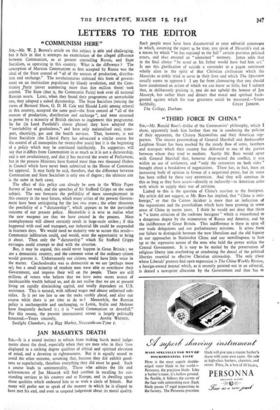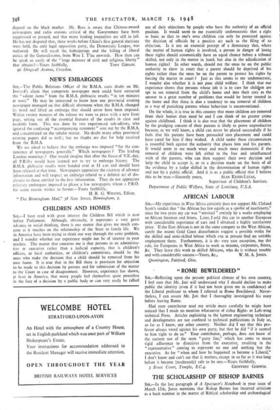"THIRD FORCE IN CHINA"
Six,—Mr. Ronald Rees's dislike of the Communists' philosophy, which I share, apparently leads him further than me in condoning the policies' of their opponents, the Chinese Nationalists and their American sup- porters. The sincere peacemaking of General Marshall and Ambassador Leighton Stuart has been mocked by the steady flow of arms, bombers and transport which their country has delivered to one of the parties between whom they tried to mediate. Surely Mr. Rees would agree with General Marshall that, however deep-seated the conflict, it was within an ace of settlement, and "only the extremists on both sides" brought about a breakdown of negotiations. There has, in fact, been an increasing body of opinion in favour of a negotiated peace, but its voice has been stifled by these very extremists. And they will continue in this so long as they have access—directly or indirectly—to American urns! with which to supply their war of attrition.
Linked to this is the question of China's reaction to the foreigner. My article did not suggest, as Mr. Rees has implied, that "China is anti- foreign," or that the Canton incident is more than an indication of the separatisms and the parochialism which have been growing in some areas of China in recent years. I think he would not deny that there is " a latent criticism of the cocksure foreigner " which is exacerbated to a dangerous degree by the manoeuvres of Russia and America, and by the indifference of Great Britain. This indifference is there in spite of our trade delegations and our parliamentary missions. It arises from our failure to distinguish between the new liberalism and the old bigotry in our approaches to Nationalist China and our unwillingness to face up to the repressive nature of the men who hold the power within the Central Government. It is easy to be misled by the preservation of religious liberty into overlooking or condoning the denial of the political liberties essential to effective Christian citizenship. The only place where Liberals' protests find open expression is The China Weekly Review, a foreign-owned journal which, as it recently pointed out in an editorial, is denied a newsprint allocation by the Government and thus has to depend on the black market. Mr. Rees is aware that Chinese-owned newspapers and radio stations critical of the Government have been suppressed or purged, and that many leading journalists are still in jail. He has not disputed that, three weeks before China's first general elections were held, the only legal opposition party, the Democratic League, was outlawed. He will recall the kidnappings and the killing of liberal critics of the Generalissimo, from Wen I. T'ou onwards. How then can he speak so easily of the " large measure of civil and religious liberty "































 Previous page
Previous page